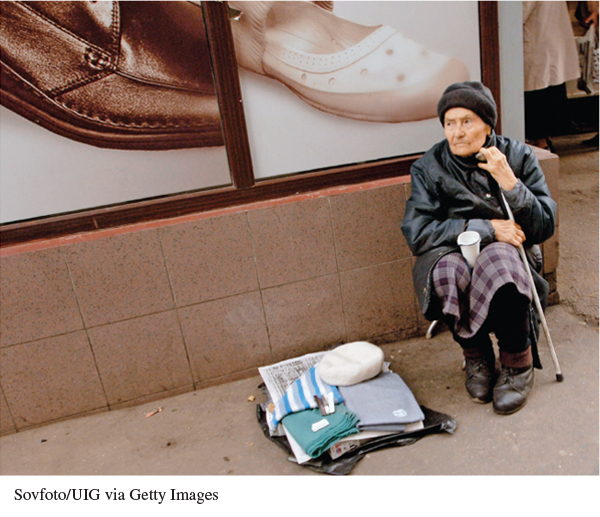A History of Western Society: Printed Page 1020
A History of Western Society, Value Edition: Printed Page 979
A History of Western Society, Concise Edition: Printed Page 1022
Economic Shock Therapy in Russia
Politics and economics were closely intertwined in Russia after the dissolution of the Soviet Union (see Chapter 29). President Boris Yeltsin (pres. 1991–1999), his democratic supporters, and his economic ministers wanted to create conditions that would prevent a return to communism and right the faltering economy. Following the example of Poland (see Chapter 29), and agreeing with neoliberal Western advisers who argued that a quick turn to free markets would speed economic growth, Russian reformers opted in January 1992 for liberalization at breakneck speed.
To implement the plan, the Russians abolished price controls on most consumer goods, with the exception of bread, vodka, oil, and public transportation. The government launched a rapid privatization program, selling formerly state-
President Yeltsin and his economic advisers believed that shock therapy would revive production and bring widespread prosperity. The results were quite different. Prices increased 250 percent on the very first day and kept on soaring, increasing by a factor of twenty-

Rapid economic liberalization worked poorly in Russia for several reasons. Soviet industry had been highly monopolized and strongly tilted toward military goods. Production of many items had been concentrated in one or two gigantic factories or in interconnected combines. With privatization, these powerful state monopolies became powerful private monopolies that cut production and raised prices in order to maximize profits. Moreover, Yeltsin’s government handed out enormous subsidies to corporate managers and bureaucrats, ostensibly to reinforce faltering firms and avoid bankruptcies, but also to buy political allegiance. New corporate leaders included criminals who intimidated would-
Runaway inflation and poorly executed privatization brought a profound social revolution to Russia. The new capitalist elite — the so-
At the other extreme, the vast majority of people saw their savings become practically worthless. Pensions lost much of their value, living standards drastically declined, and many people sold their personal goods to survive. Under these conditions, effective representative government failed to develop, and many Russians came to equate democracy with the corruption, poverty, and national decline they experienced throughout the 1990s. Yeltsin became increasingly unpopular; only the backing of the Oligarchs kept him in power.